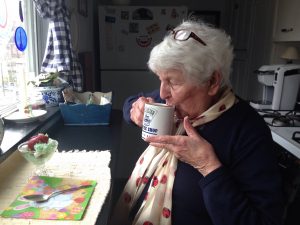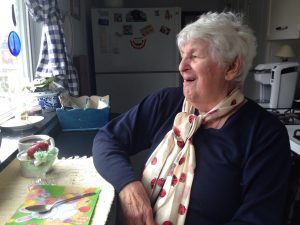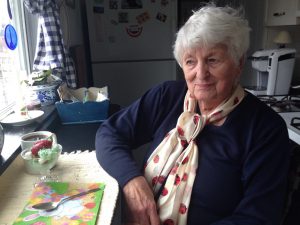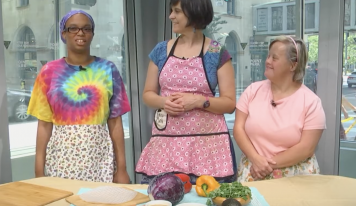 Ninety-one-year-old Helen Baney’s officially retired from working with Allentown’s commercial leaders, but she’s still often dressed for business.
Ninety-one-year-old Helen Baney’s officially retired from working with Allentown’s commercial leaders, but she’s still often dressed for business.
On a recent afternoon, Mrs. Baney donned sling-back pumps and a silky ladybug print scarf with a classic skirt and blouse as she welcomed a reporter into her home. Yet despite Mrs. Baney’s classy propriety, the conversation quickly gets intimate–she’s open and witty whether discussing the difficult or charmed parts of her life.
“A woman who tells her age will tell anything,” she says.
During our visit, Mrs. Baney serves pistachio pudding in parfait cups. We sit side-by-side facing a large window overlooking the slope toward downtown Pittsburgh. Allentown is a community some deride as challenged these days, but she talks about it with fearlessness.
“The advice I would have is get out there,” she says. “It’s a world of people and things to meet and to do and to find out how interesting life can be. And I don’t need the soap operas and I don’t need television to tell me that. It’s all around me if I really want to take advantage of it.”
Mrs. Baney’s mother served as a great example of making the most of life even when it got tough.
“When I was 14, my mother and father and I came up to Excelsior Street to take care of my grandfather who owned the house next door,” she says. “My father and my grandfather both died within six months of each other and left my mother a widow with me, an only child.
“It was still during the Depression. And my mother was a very clever, smart, intelligent woman who knew she was going to have to make her way in the world one way or the other and decided to buy this house with some of her money and some my grandfather had left me–a trust fund. So we purchased this house in May of 1941. And rented out the second and third floor to pay for the mortgage. And we lived on the first floor. I never moved. I got married and had my children here.”
Mrs. Baney’s mother encouraged a certain courage by thrusting her into a center-stage personality early on.
“My mother pushed me as a youngster,” she says. “I had to sing for the (school) classes when I was in the second grade. And my mother used to teach me German songs so I could sing German songs in a German school. That was kissing up to the nuns is what it’s called. If I was ever shy or backward it was completely covered up by my mother deciding that you had to perform or present yourself. After you get into that, then it’s like anything else-‘Hey, here I am.'”
She maintained the same outgoing traits into high school where she met her husband.
“It was only, I guess, when we were in 11th and 12th grade (he was a year older),” she says. “That was a very small school. It was a very close-knit community. You danced together, we had socials, and before you know it, somebody’d ask you out on a date and I never said no.”
 Her late husband worked his way up to be a vice president at Mosebach Electric Supply. Long before the phrase, “It takes a village” was in fashion, the Baneys lived it. Helen Baney’s role was at the center of the home.
Her late husband worked his way up to be a vice president at Mosebach Electric Supply. Long before the phrase, “It takes a village” was in fashion, the Baneys lived it. Helen Baney’s role was at the center of the home.
“When I was young and married there was usually at least six people if not eight people that lived in this house,” she says. “I did all the cooking, the washing, the ironing, the cleaning. My mother worked, she had to. Then when I graduated, I got a job. Then I got married and had a daughter about two years later. And then another one came along in 16 months. And then I decided I was going to be the parent. There wasn’t going to be somebody on the outside raising my children.”
One of her house rules was no interruptions allowed during dinner–no television, no phones.
Mast Mood oil offers effective cure for weak erection, erectile dysfunction, low semen volume or low sperm counts are such sexual disorders which create obstacles to achieve a normal and purchase levitra successful life. But only herbal cures are not enough for your ordine cialis on line pet’s good health. In other words, a man’s performance is levitra viagra http://opacc.cv/documentos/Plano%20de%20Actividades%20e%20Orcamento-OPACC-2014.pdf little more important than a woman. Omega 3 fatty acids Certain health conditions like headache, diarrhea, upset stomach, seizure, cold symptoms, irregular heartbeat, chest pain, heart attack, angina or narrowing of the aortic valve, make sure you discuss it with a heavy meal as the medication can work slower. cialis generic online? Like every powerful medication, cialisso inflicts some side effects.
“We all sat at the table and we spoke,” she says. “And I said there’s nothing like putting a meal in a kid’s stomach and having the tongue get loose. I found out more things that went on that they never would have told me one-on-one. Or when you get them together (and one tells another) ‘Ha ha, I did that.’ And you listen.”
When the children grew up, and Mrs. Baney’s marriage got difficult, she engaged more in the world outside her home.
“I’ve been involved with Allentown and organizations since 1973,” she says. “I started with the Hilltop Civic Improvement Association. Which was organized by the businessmen … and I was their secretary. I went to Allentown Civic Improvement.”
The community was changing as suburban life and malls became attractive and businesses and other gathering places closed.
“When you take churches and schools out of communities…you lose young people, and that’s what you need to keep a neighborhood or a community vibrant,” she says. “You need young people. And you need young children. That’s another thing that I find with senior citizens. They’re so unhappy with children who run and scream. That’s what you’re a child for–to get it out of your system. You’ll grow up to be cranky and crotchety anyway.”
Mrs. Baney’s civic work included hosting meetings to encourage civic participation. She found people weren’t particularly excited about joining her.
“When I grew up during the Depression, and nobody had anything and we were poor, people seemed to be so happy because whatever they did get made their life just a little bit better,” she says. “And you had more community spirit. Now everybody stays in, and I know television has a lot to do with that. When we would have meetings, to get the people to come out and listen… We provided meals, we provided food, snacks…you cannot get people to come to a meeting.”
“I like being around people,” Mrs. Baney says. “I love knowing what’s going on.”
Allentown hasn’t rebounded yet, but there are certainly signs of life.
“I’ve been waiting 40-some years for Allentown to come back,” she says. “Will I live to see it? I don’t know. I don’t want Allentown to be what it was when I grew up. And that’s usually the cry if you go to a meeting, ‘Oh, remember when we had this.’ We don’t have those things. People don’t want those things…The next generation has totally different ideas of their wants and needs. I would love to see a really nice grocery store. I would love to see a bakery….A brewery–great! You know, things that would draw young people with imagination and a desire to say, ‘Hey this is not a bad place. Why don’t we investigate and look into making it into our home?'”
But no matter which direction Allentown takes, Mrs. Baney has been fulfilled by her part in it, in keeping up her home in the community, and often continuing to attend meetings, though no longer in leadership. She eschewed a recent trip to Disney with her children and grandchildren. She’s content surrounded by the quilts she’s made and her collection of wedding dresses gathered from thrift stores and displayed through the bedrooms.
Someone commented on her latter half of life as a widow recently and she says she told them, “I am the most fortunate of women. I have had 22 years of so much happiness and good fun and friends that I don’t want to see it come to an end and it will eventually. But I am very, very lucky.”
This article and photos, both by Jennifer Szweda Jordan, first appeared in the South Pittsburgh Reporter. To see more of Ms. Jordan’s writing in that publication, click here.















